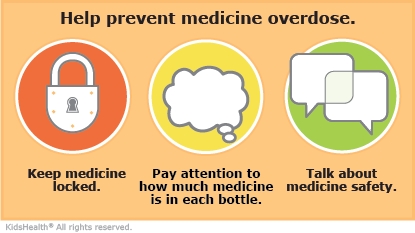Dextromethorphan is a medicine used to help with coughing. Taking too much can cause serious health problems. Your child stayed at the hospital so the health care team could check for and treat any problems. Your child is now ready to go home. This is a good time to review how to store and give medicines safely.

Home Care
- If your child is under 6 years old, do not give dextromethorphan. Cough (and cold) medicines can have serious side effects in young kids.
- If your child is over 6 years old, don't give dextromethorphan again until your health care provider says it's OK.
- If your child took the medicine on purpose, follow up with a psychiatrist, psychologist, or counselor as recommended by your health care provider.
Preventing Medicine Overdose
- Give medicines safely:
- Follow the package directions for how much medicine to give and how often.
- If the medicine comes with a dropper or cup, use that to give the medicine.
- For medicines you will give more than once, or when giving more than one medicine, write down or note on your phone the name and dosage of the medicine and the time you gave it.
- When you give more than one medicine, be sure they don't contain the same ingredients.
- Don't call medicine "candy" when trying to get your child to take it.
- Store medicines safely:
- Keep all medicines (even those you can buy without a prescription) in a locked cabinet, out of the reach of children.
- Put medicines away after giving a dose.
- Keep purses and handbags that might contain medicines away from kids.
- Make sure the lids to all medicines are tightly closed.
- Always keep medicines in their original containers.
- Keep track of how much medicine is left in a bottle. You can write the date on the label and the number of pills or draw a line at the level of liquid medicine.
- Know about the medicines you have in your home. Get rid of those you no longer need. If you're not sure how to get rid of medicines, talk to your health care provider or visit fda.gov/consumers/consumer-updates/where-and-how-dispose-unused-medicines.

- You're worried that your child is using dextromethorphan (or other substances) to get high.
- You have questions about what dosage of medicine your child needs or if a medicine is safe for your child.
- Your child seems sleepier than usual.
You know your child best. If you see symptoms that worry you, call your health care provider right away.

Your child:
- is confused
- seems clumsy
- is hard to awaken
- is sweatier than usual
- is seeing or hearing things that aren't there
- has a seizure (uncontrolled jerking movements)
Call 911 if your child has these symptoms and it will take longer than 15 minutes for you to take them to the ER.

What is dextromethorphan? It is a cough suppressant, which means it can reduce or stop coughing. It is available without a prescription:
- as a single medicine (Delsym®, Robitussin®, or store brands)
- as part of a combination medicine (Delsym® Nighttime Cough, Robitussin-CF®, Robitussin-DM® Nighttime Cough, Mucinex-DM®, Tylenol® Cold + Flu, or store brands)
How can a child get too much dextromethorphan? An adult might accidentally give the wrong dosage or use different brands of cough or cold medicine at the same time, not realizing they contain the same ingredients. A young child might find the medicine and take it out of curiosity. Because dextromethorphan can cause a pleasant feeling, someone might take too much on purpose, trying to get high. Sometimes, people take dextromethorphan to hurt or try to kill themselves.
What can happen if someone gets too much dextromethorphan? Too much can lead to extreme tiredness, feeling high, seeing or hearing things that aren't there, agitation, fast heartbeat, seizures, and even coma.
What should I do if I think my child got too much of any medicine? Call Poison Control right away for advice (800-222-1222). Keep the number posted in your home (for example, on the refrigerator) and put it in your phone contacts.




